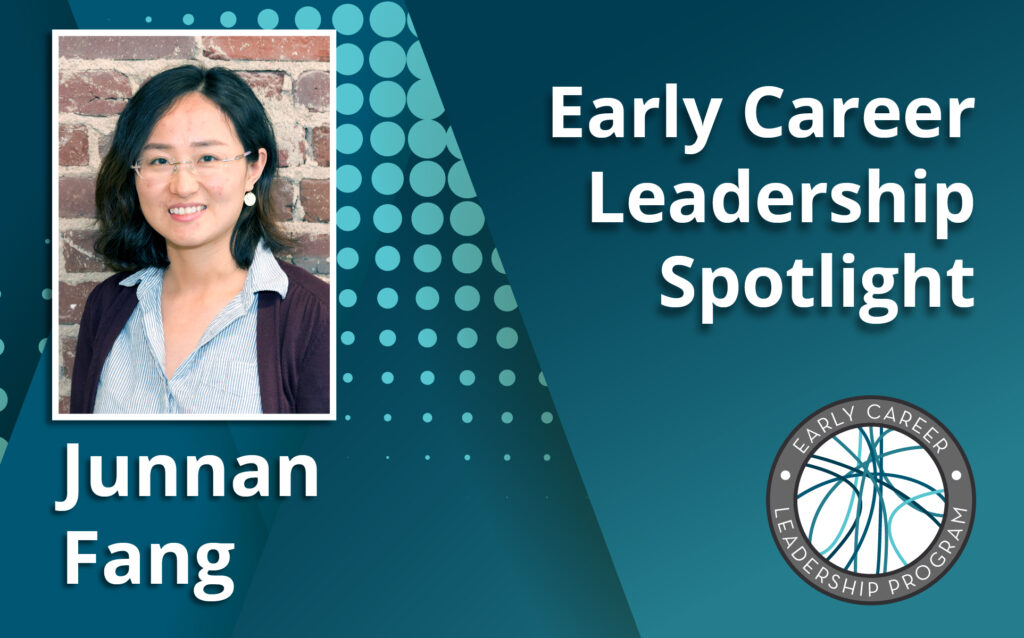We’re taking time to get to know the members of the GSA’s Early Career Scientist Committees. Join us to learn more about our early career scientist advocates.
Junnan Fang
Career Development Subcommittee
Emory University
Research Interest:
Cancer is one of the leading causes of death worldwide. According to the GLOBOCAN report, in 2020 there were 19 million new cases diagnosed and nearly 10 million cancer-related deaths worldwide. Cancer causes physical, mental, and financial destruction to patients and families and leads to enormous economic costs on a global scale. I started thinking a lot about cancer as a teenager when my grandma died of stomach cancer. I wished her cancer had been diagnosed and treated earlier.
Chromosome instability is a hallmark of cancer; therefore, it is important to understand how chromosome stability is precisely regulated. Throughout my research training, my research interests have focused on how the centromere and the centrosome, two types of machinery in cell division, regulate chromosome stability. I will continue my research, in hopes of identifying new biomarkers for cancer diagnosis and providing new insights into developing better therapeutic strategies.
As a PhD-trained scientist, you have many career options. What interests you the most?
In addition to mentoring the next generation of scientists, my career goal is to lead an independent lab in a research-focused institute and study the mechanisms that safeguard chromosome stability. The academic environment is where the most advanced aspect of scientific research takes place. I am passionate about uncovering the complexity and depth of information in the levels of molecular and cell biology that have yet to be discovered.
I have greatly enjoyed training and mentoring other people at different academic career levels. I always want to apply my skills and knowledge to positively influence others. Throughout my educational and research training, I was fortunate to have support from teachers and mentors, along with inspiration from colleagues. I am eager to pay it forward and mentor next-generation scientists.
In addition to your research, how do you want to advance the scientific enterprise?
In the future, I see myself as an independent researcher, mentor, and leader.
In addition to my research and publication, I would like to advance the genetics community through scholarly peer review. From 2021 to 2022, I served as a peer reviewer in the American Heart Association’s Basic Science Committee, in which I reviewed, discussed, and scored pre- and postdoctoral fellowships. Currently, I serve as a peer reviewer for Cell Cycle. In addition, I am participating in the GENETICS peer reviewer training program, where I review manuscripts and receive feedback from GENETICSeditors. Getting involved in the peer-review process will not only advance my career but also help me serve the scientific enterprise with my newly acquired knowledge and skills.
As a female researcher and mother of two young children, I understand firsthand the challenges of balancing multiple roles while pursuing a career in science. It is disheartening to see many of my female colleagues and friends postpone or give up on their career aspirations due to societal expectations. I am committed to supporting other female scientists by creating a supportive environment in my future lab and offering flexible schedules to accommodate trainees’ motherhood and other commitments.
Working with minority groups during my research training made me realize that everyone has distinct educational challenges and requires different mentoring approaches. Thus, as a mentor and educator, I will provide a learning environment that is welcoming and inclusive, where every student has equal access to educational resources and opportunities. My team, for instance, will welcome students and scholars, regardless of race, ethnicity, gender, religion, sexual orientation, abilities/disabilities, and socioeconomic status.
As a leader within the Genetics Society of America, what do you hope to accomplish?
Since joining the GSA Early Career Leadership program, I have enjoyed it much. With the support of the Career Development Subcommittee, I have co-organized workshops, networked with peers on different career paths, and provided a bridge between peers and early career students and postdocs. Organizing these workshops has also helped me improve my leadership skills.
During my remaining time in the ECLP, I will continue to organize workshops and/or conferences to build relationships with professionals and companies in the larger scientific community, create deeper connections with the Society and its members, and help GSA members and the public with their career development plans. On a personal note, I plan to expand my network and further improve my leadership skills through the ECLP.
Previous leadership experience
2021–2022 Peer reviewer, American Heart Association Pre- and Post-doctoral Fellowships
2021 Co-chair of the session “Life and death: Regulation of stress, cell cycle, cell growth, and cell death,” 62nd Annual Drosophila Research Conference
2021 Poster judge, 62nd Annual Drosophila Research Conference
2021–Present Reviewer: GENETICS
2019–Present Reviewer: Cell Cycle




